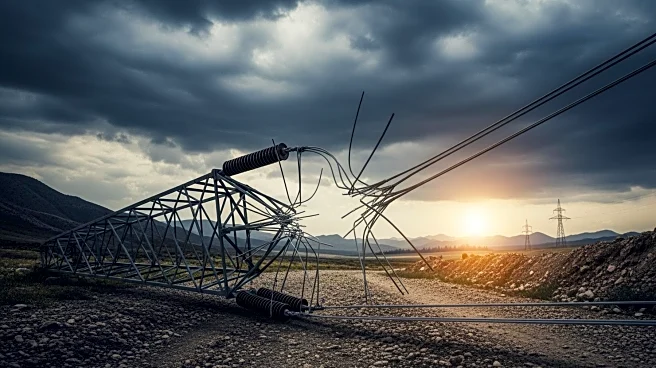What's Happening?
Ukrainian military strikes targeted Russian energy infrastructure in border regions, resulting in significant power outages affecting over 20,000 residents. The Belgorod region's Governor Vyacheslav Gladkov
reported severe damage to the electricity and heating supply network in the regional capital, leaving several streets without power. In the Kursk region, a fire at a power plant in Korenevo disrupted electricity for 10 municipalities, as confirmed by Governor Alexander Khinshtein. Additionally, a heating facility in the Voronezh region experienced a fire, further complicating the situation. The Russian Defense Ministry claimed to have destroyed 44 Ukrainian drones over the Bryansk border region. These developments follow recent Russian attacks on Ukrainian infrastructure, which have left Ukraine struggling to restore power and heating, with its generating capacity reduced to zero.
Why It's Important?
The strikes highlight the ongoing escalation in the conflict between Ukraine and Russia, with both sides targeting critical infrastructure. The power outages in Russian border regions underscore the vulnerability of civilian infrastructure in conflict zones, affecting thousands of residents and potentially disrupting daily life and economic activities. For Ukraine, the attacks on its energy facilities exacerbate existing challenges in maintaining essential services amid the conflict. The situation could lead to increased tensions and further military engagements, impacting regional stability and international relations. The targeting of infrastructure also raises concerns about the humanitarian impact on civilians caught in the crossfire.
What's Next?
The ongoing conflict suggests potential for further military actions and retaliations from both Ukraine and Russia. Russian authorities may increase security measures in border regions to prevent future strikes, while Ukraine might continue targeting strategic infrastructure to weaken Russian capabilities. International stakeholders, including neighboring countries and global powers, may seek diplomatic solutions to de-escalate tensions and address humanitarian concerns. The situation could also prompt discussions on energy security and infrastructure protection in conflict zones.
Beyond the Headlines
The targeting of energy infrastructure in the conflict raises ethical questions about the impact on civilian populations and the long-term consequences for regional stability. The destruction of power facilities not only affects immediate living conditions but also poses challenges for reconstruction and economic recovery post-conflict. The situation may influence international policies on conflict resolution and humanitarian aid, emphasizing the need for protecting civilian infrastructure during military engagements.








